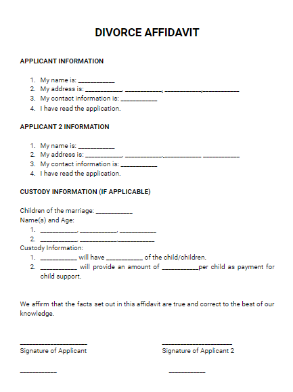- Eviction Notice Forms
- Power of Attorney Forms Forms
- Bill of Sale (Purchase Agreement) Forms
- Lease Agreement Forms
- Rental Application Forms
- Living Will Forms Forms
- Recommendation Letters Forms
- Resignation Letters Forms
- Release of Liability Agreement Forms
- Promissory Note Forms
- LLC Operating Agreement Forms
- Deed of Sale Forms
- Consent Form Forms
- Support Affidavit Forms
- Paternity Affidavit Forms
- Marital Affidavit Forms
- Financial Affidavit Forms
- Residential Affidavit Forms
- Affidavit of Identity Forms
- Affidavit of Title Forms
- Employment Affidavit Forms
- Affidavit of Loss Forms
- Gift Affidavit Forms
- Small Estate Affidavit Forms
- Service Affidavit Forms
- Heirship Affidavit Forms
- Survivorship Affidavit Forms
- Desistance Affidavit Forms
- Discrepancy Affidavit Forms
- Guardianship Affidavit Forms
- Undertaking Affidavit Forms
- General Affidavit Forms
- Affidavit of Death Forms
Marital Affidavit
Past the fairytale ending of a romantic story comes the real-world responsibilities that exist with every form of companionship. The legal aspect of a blossoming relationship or one that is ending is not something that a couple would first think of when opening a new chapter in their lives, with little knowledge of the importance of having everything written on paper. In the event that you and your spouse separate or divorce or decide to document your domestic relationship, one of the key documents you’ll need is a Marital Affidavit. To learn more about this document, read on to find out. Read More

What Is a Marital Affidavit?
A Marital Affidavit contains a sworn statement used to verify and detail the relationship between two individuals who have legally separated or called off a marriage, or to those who wish to document their domestic relationship for government or employer benefits. The contents of this type of affidavit vary according to what the document is intended for, as each affidavit should express specific information about a matter that may be useful for any legal purpose.
Five Tips on How You Can Create a Marital Affidavit
Understanding how to write a Marital Affidavit can save you time and money. It’s even more efficient when you fill up pre-drafted forms that already outline the essential parts of an affidavit. But even when using a form, there are a few things you need to be mindful of to ensure that your affidavit remains readable and acceptable for whatever personal or legal affair you intend to use it for. The following guidelines should help you get started:
Provide the Necessary Information
An affidavit typically begins with a brief introduction of the writer(s) and the reason for creating the affidavit. The most important pieces of information to include in the document are the full legal names of the parties involved and other necessary information relevant to their situation. For instance, couples declaring domestic partnership will need to provide details about their place of residence with supporting documents to verify this claim. Divorce affidavits, on the other hand, further detail the domestic duties of each partner, the parental responsibilities (for parenting settlements), and financial contributions to the household.
Stick to the Facts
Anyone who signs an affidavit must provide information that is true and accurate “to the best of one’s knowledge and belief.” Thus, you must avoid opinions and secondhand accounts that you have no hard evidence to support. It’s always a good idea to verify the kind of information that the entity requesting the affidavit might require, as the number of facts you include in an affidavit greatly depends on your situation. By having this point clarified beforehand, you can focus on the facts that are relevant to the case.
Be Clear and Concise
As previously stated, you’ll want to make a list of facts that are essential to your purpose. You don’t need to detail every single thing about your relationship or the arguments you might have had during your marriage unless it can be used to prove or disprove an important fact or issue that you are facing. You’ll also want to keep your content as short and as organized as possible. Headings and subheadings can be helpful for lengthy documents, so are bulleted and numbered lists.
Write in the First Person
When you write in the first person (using “I” and “we” rather than “they/their” or “he/she”), it makes it apparent that you’re providing statements told from your perspective. It also helps keep the affidavit relevant and truthful.
Sign and Notarize
Before signing and dating the affidavit, make sure to review your state laws to determine the signatory requirements. Some states require the acknowledgment and signature of a witness and a notary, or a notary or oath commissioner alone. These signatories are essential to legally verify the identity of the affiants and authenticate the affidavit. If you aren’t familiar with your state laws, it would be best to seek legal advice from the appropriate entities beforehand.
FAQs
What happens if you don’t get a marital affidavit?
There are many instances where you may be asked to provide proof of your relationship with a particular individual. You may find it too difficult, or virtually impossible, to file certain applications or petitions or claim benefits without the affidavit in place, which will only lead to even bigger problems and more costly legal fees for you to settle.
What do I need to verify my marital affidavit?
While it’s easy to claim that every bit of information presented in the affidavit is true, you’ll still need to gather enough evidence to prove your statements for the notary public to help authenticate the affidavit. Letters, bills, contracts, lease agreements, bank statements, and other supplemental documents bearing both your names may help verify you and your partner’s (or ex-spouse’s) identity.
How long is a marital affidavit valid for?
Generally, affidavits are valid indefinitely. However, if any or all of the information contained in the document is proven to be false, then the affidavit will no longer be effective. The same applies to affidavits that identify the specific purpose of the legal document in the body of its content.
Who can witness an affidavit?
Apart from the affiant(s), another individual must also be present when signing the affidavit. It has to be someone who is not involved in the affidavit, along with a notary public. Only authorized persons are allowed to bear witness statements to prove the truthfulness of an affidavit, and family members are not always the best option due to the potential for an actual or perceived conflict of interest.
What’s great about Marital Affidavits is how you can easily draft the document without the assistance of a legal expert. The guidelines above should help you through the process for a convenient writing experience, especially when you find yourself in piles of paperwork to prepare. By following these steps, you should be able to complete a legally valid affidavit for any personal or business purpose in no time.
